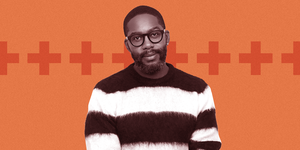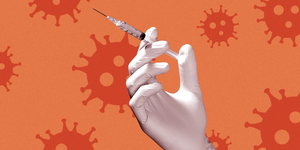You can’t get away from hearing about, talking about, and thinking about the Covid-19 vaccine topic right now. And there are days when it seems like everyone in the world but you—even your young and healthy friends—has found a way to get the vaccine.
That’s technically good news, considering the death toll has been unimaginable. But it can also feel, let’s face it, frustrating as hell. While President Joseph R. Biden, Jr. stated in an address last week that all Americans will be eligible to get a vaccine no later than May 1, that can still feel far off when you’re one of the only people you know who hasn’t gotten one.
For Jason Payton, a consultant based in Atlanta, Georgia who’s not yet eligible, “watching others get the vaccine is exciting and frustrating,” he says. He’s glad to see people get vaccinated. As he and his wife and kids ages 10 and 5 wait their turn, they’re not going down the road of taking advantage of “workarounds” that would accelerate access for them. “I am certainly ready to get vaccinated, but I do not want to feel like I moved ahead of someone in greater need of protection than me,” he says. But he acknowledges waiting one’s turn is not always easy. “It is also difficult to wait through a confusing vaccine distribution process.”

Frustration is just one of the many feelings this situation is causing, as is annoyance. Jealousy? There’s that, too. “Vaccine envy is real,” adds Aeva Gaymon Doomes, MD, a licensed psychiatrist in private practice in Washington, D.C.
Seeing all of the #covidshot posts on Instagram— there are 2.1k and counting— doesn’t make it any easier. “If we’re in a lower “access priority” group, it can really chafe to see people posting these images – especially when they do feel boastful,” explains Shauna Springer, Ph.D., chief psychologist for the Stella Center in Oak Brook, IL. “In the worst cases, it feels like an ostentatious, utterly tone-deaf message that divides the world, yet again, into “haves” and “have nots.”
Exacerbating this is the feeling of extreme violation when you see true line jumpers—those who have lied or bought their way into a vaccine. The reality: Yes, some people are gaming the system, but others are not, and we don’t know where everyone falls on this spectrum. All of this can send our mind and our emotions racing, says Springer.
Men like Maurice Hendrix, a federal grant monitor in Washington, D.C. have been on the other end of that. He recently received the Johnson & Johnson vaccine as a result of the government opening vaccines to people located in specific zip codes. “Everyone was looking at me like, ‘he is healthy, under 65, and he is not a doctor, so how did he get it?’” Hendrix, who has a background in forensic psychology, says “it implies that I broke a rule because I am not in one of those categories that should be getting it. And then heaven forbid you have a parent or grandparent that hasn’t had the vaccine and then you are looking at me…” Hendrix even says that after posting on social media that he received his vaccine, one of his doctor friends jokingly texted him asking him what illegitimate acts he engaged in to get the shot.
It’s tempting to jump to conclusions. “I like to tell my patients that their health is no one else’s business,” says psychiatrist and MH advisor Gregory Scott Brown, MD, founder and director at the Austin-based Center for Green Psychiatry. That means that the health of others isn’t your concern, either. “We might find ourselves casting judgement on a seemingly “young and healthy person” and thinking “how did they get the vaccine?” Maybe they have a comorbidity like Type 1 Diabetes, you never know.”
And mixed in with all this envy may be questioning whether the efforts to protect your health are really paying off, since those who are considered healthiest are also the last ones eligible for the vaccine.
How frustrated you feel may also have to do with how much you trust the system in place to take care of you. “If we trusted the systems in place to administer the vaccine in a just, transparent, even-handed way, it would be easier for many of us to wait our turn. When we see a violation of what feels fair, it’s natural to have an emotional response,” says Springer.
How to feel less frustrated
To avoid staying angry and frustrated, look at the big picture, says Dr. Brown. “Rather than focusing on the imperfections in the way vaccines have rolled out, focus on the fact that we’re all a lot closer to normal than we were a few weeks ago,” he recommends. Also consider that we may not be far from any adult being able to access the vaccine.
Also, untangle what’s at the root of your vaccine envy. Part of the desire for the vaccine is to self-preserve. Generally, when in survival mode, humans do become selfish to some degree and will innately switch to self-preservation, says Dr. Doomes.
It’s all very complicated, and “sitting with a range of complicated emotions can increase our sense of helplessness,” says Springer. So she recommends that you ask yourself some questions to see if you can get clarity on exactly what it is that’s driving your emotions around this.
She suggests asking yourself questions such as: How does a perceived disparity impact me, personally? How does it affect those I love and want to protect? How can we, as a society, balance our own individual rights and needs against the needs of others? Do we trust the greater systems that are set up to protect us?
“The process of analyzing our emotions and putting words to them is part of what can bring us relief,” she says. For example, if you uncover that fear really is the driving emotion, then you can come up with a plan to manage the fear—maybe limiting your exposure to alarming news reports and focusing on what you can do to keep yourself and the people you love safe for the present.
In addition, it may be helpful to come up with a plan for getting access to the vaccine when you can. “For example, in some areas of the country, it’s possible to “fly standby” and get a leftover dose that would have gone to waste otherwise,” Springer says. “No one is being bumped out of line if we access these opportunities.” Just be aware that people who try this may become even more frustrated if day after day they don’t get the call or text they are hoping to get. “It’s more important to realize that stewing won’t accomplish anything,” Dr. Brown says. “It’s like stewing in October over the fact that Christmas isn’t here yet, rather than looking forward to the holiday season to come. Almost all of the scientific experts are telling us that we have a lot to look forward to, and because of this, we can use optimism to make this an exciting time.”
It’s also just good to recognize that “while it is not everyone’s ‘turn’ right now,” says Dr. Doomes, “the greater good is being done, and that is to our benefit as well.”
Source: Read Full Article



